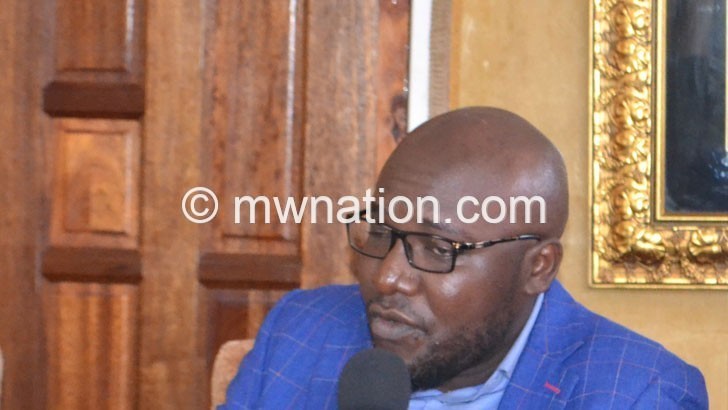Healing malawi Mtambo-style
There have been questions over the relevance of the Ministry of Civic Education and National Unity. In this interview, our Staff Reporter JOHN CHIRWA asks the line minister Timothy Mtambo what his job description entails.

Q
: The President has given all Cabinet ministers six months to prove your performance. What are your targets in this period?
A
: Our ministry is relatively new, especially the aspect of national unity. In the next five months, we will have to do a lot of strategic planning, setting up the Department of National Unity and meeting different stakeholders. We will have countrywide consultations to understand what divides us, our real challenges and how best can we address them. We want to design programmes that are all-inclusive—programmes that will reach out to all Malawians.
Q
: What new things should people expect from this ministry?
A
: Civic education has always been part of the Ministry of Information. It pleased the Tonse administration to isolate it into a specific ministry because empowerment of citizens is now pursued as a full project, a priority for the new administration.
The previous administrations focused mostly on the information and less on the civic education part because their objective was to use information and all information institutions like Malawi Communications Regulatory Authority and State media institutions such as Malawi Broadcasting Corporation (MBC) and Malawi News Agency (Mana) as tools of oppression, state propaganda, deception and manipulation of the public.
The strategy of capturing State institutions of information to manipulate and influence public narratives and opinions in favour of the interests of the ruling elites is common among all regimes that are despotic. They fear to give power to the people and build an active citizenry because a non-empowered citizenry enables them to abuse the systems and escape accountability. That, however, has been defeated as the new Tonse administration is committed to enhancing a well-informed, empowered and active citizenry—which is key to the full realisation of a democratic developmental state in Malawi.
Q
: How is the aspect of civic education coming in?
A
: The Tonse administration understands that democratic governments thrive on an informed citizenry. Therefore, civic education becomes key as it equips citizens with public knowledge and information to enhance their levels of participation in democratic processes of socio-economic and public life. In this regard, civic education facilitates the creation of a vibrant democratic state where citizens are socially literate enough to demand accountability from office-bearers and make informed decisions on matters of national importance.
To that extent, our experience with the post-2019 elections has taught us that if citizens are well empowered, then they can come together to resist a corrupt regime and replace it with a government of their choice. Our past and present has a plethora of evidence of why Malawians must pursue unity, justice and a healing project.
For example, you will recall that some of the grievances that prompted our departed brothers and sisters to rise up and defend our democracy on July 20 2011 had to do with tribalism, regionalism, nepotism, political intolerance and corruption which have all along crippled social cohesion and unity of Malawians. The fear of degenerating into that era again propelled our collective resolve to protest without fear after the fraudulent presidential election of 21 May 2019 and here we are as a triumphant society of that struggle.
Q
: Any lessons from that struggle?
A
: Through such moments of tragedy and struggle to liberate ourselves and demand a better country, we have learned the importance of national unity. Yes, we have learned through it all, that if we burry our tribal, regional, religious and political differences and come together with the spirit of national unity, we can overcome and set this country on the path towards rebuilding and formidable success. That is why it pleased the President to merge civic education and national unity.
Q
: What mechanism have you put in place to champion this national unity
A
: The ministry shall adopt relevant policies, guidelines, programmes and strategies to civic educate and unify Malawians around a common agenda for the development of the country—an agenda that shall promote patriotism; unity in diversity; active citizenship; and the realisation that with focus and unity of purpose, we are achievers. We will propose measures and actions that shall contribute to the eradication of nepotism, tribalism and regionalism among Malawians to reinforce the sense of unity. We shall denounce all manner of actions, publications and utterances that promote any kind of divisiveness, discrimination and intolerance whether on political, religious or tribal fronts.
Q
: Where are the wounds of disunity that your ministry seeks to heal?
A
: Malawi has not healed since we got independent in 1964. Malawi saw the dawn of political pluralism in 1993 but did not heal. Our country has just changed leadership, but it needs to heal. It is this lack of healing that has made politicians keep referring to old atrocities by forcing MBC to air programmes like Never Again, Sapita Kawiri. Such irresponsible thinking does not build the nation. I will be having bilateral talks with the Minister of Information so that such kind of programmes that only help to divide Malawians are not given space. MBC should be a government mouthpiece for progressive and transformative agenda; hence, it cannot be so reckless by airing programmes that only help in creating divergence among Malawians.
My ministry will put in place a team of various stakeholders that will champion the national healing process through the truth and reconciliation programme. Malawians can only forgive and forget if we create a forum where everybody knows what happened, why it happened, lessons that we can draw from what happened and also how to avoid that in future so that we move on together as a nation. That is the principle of transitional justice.





